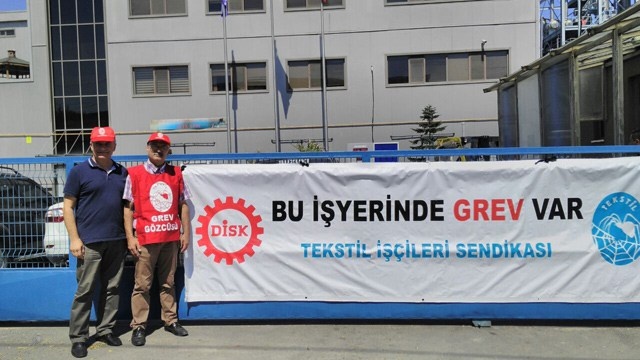22 August, 2016IndustriALL affiliate DİSK/Tekstil takes action against union busting South Korean company.
Hyosung, a South Korean textile company, has defied the law to deny recognition to IndustriALL Global Union affiliate DİSK/Tekstil for five years. Now the union is taking strike action at the company’s plant in Çerkezköy, Turkey.
Opened in 2008, the textile factory employs 339 workers. In 2011, the union won statutory recognition under Turkish labour law by recruiting a majority of workers, and the Turkish Ministry of Labour and Social Security confirmed that DİSK/Tekstil had achieved the required legal majority to be the legitimate social dialogue partner.
However, the company challenged the decision of the ministry in a case that dragged out over five years. The company used this period to try to break the union, by using pressure and intimidation, and forcing workers to choose between their jobs and their union membership.
Conditions at the factory are bad, and the union alleges that environmental and health and safety laws are violated. The high unemployment in the area allows the employer to act with impunity. Hyosung has even adopted some of the union’s suggestions and claimed them as company initiatives in an attempt to undermine the union.
The case eventually went to the Supreme Court, where the right of the union to a collective agreement was confirmed in September 2015. Based on the Supreme Court ruling, the ministry issued a collective bargaining certificate in January 2016.
However, the company has failed to respond to any communication, and has refused to enter into negotiations for a collective bargaining agreement or participate in arbitration.
IndustriALL wrote in protest to Hyosung headquarters in South Korea in June. This was also ignored.
DİSK/Tekstil commenced strike action on 18 August 2016 in an attempt to force the company to the negotiating table.
IndustriALL assistant general secretary Kemal Özkan said:
“Hyosung’s behaviour constitutes a blatant violation of Turkish labour law as well as fundamental international labour standards, including Convention 98 on the Right to Organize and Collective Bargaining of the International Labour Organization.
“We demand that the company stop its union busting, respects the verdict of the Supreme Court and the desires of its workforce, and recognizes the union.
“We stand firm in our support of our affiliate DİSK/Tekstil until this dispute is won.”
South Korean companies have a bad reputation for labour rights in Turkey and around the world. The South Korean model is seen as one where the state protects the interests of capital. The recent serious repression of trade union rights in South Korea suggests that the country’s multinational corporations believe they can export their way of doing business with no respect for local laws.



